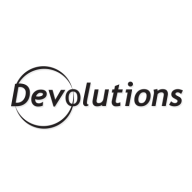


Microsoft Remote Desktop Services and Devolutions Remote Desktop Manager are both prominent remote desktop solutions. While Microsoft Remote Desktop Services is more widely supported and cost-effective, Devolutions Remote Desktop Manager offers extensive features that users believe justify the higher price.
Features: Devolutions Remote Desktop Manager offers integrated password management, team collaboration, and a wide range of remote connection protocols. Microsoft Remote Desktop Services is noted for its reliability and ease of use but lacks some advanced features found in Devolutions' offering. Devolutions provides a more feature-rich experience.
Room for Improvement: Users suggest that Microsoft Remote Desktop Services could improve by enhancing its security features and providing more customization options. For Devolutions Remote Desktop Manager, users would like to see better integration with other tools and more intuitive configuration processes. Devolutions shows fewer deficiencies compared to Microsoft’s product.
Ease of Deployment and Customer Service: Deployment for Microsoft Remote Desktop Services is generally quick and straightforward, but users report mixed experiences with customer service. Devolutions Remote Desktop Manager, while slightly more complex to deploy due to its extensive features, offers more consistent and responsive customer support. Users value Devolutions' supportive deployment model and reliable customer service.
Pricing and ROI: Microsoft Remote Desktop Services is typically more affordable and provides a good return on investment, especially for smaller businesses or straightforward use cases. Devolutions Remote Desktop Manager, although more costly, is seen as worth the investment due to its comprehensive features and robust functionality that leads to long-term benefits.
| Product | Market Share (%) |
|---|---|
| Microsoft Intune | 9.6% |
| Microsoft Remote Desktop Services | 9.1% |
| Devolutions Remote Desktop Manager | 1.4% |
| Other | 79.9% |



| Company Size | Count |
|---|---|
| Small Business | 116 |
| Midsize Enterprise | 46 |
| Large Enterprise | 152 |
| Company Size | Count |
|---|---|
| Small Business | 6 |
| Midsize Enterprise | 2 |
| Large Enterprise | 1 |
| Company Size | Count |
|---|---|
| Small Business | 39 |
| Midsize Enterprise | 16 |
| Large Enterprise | 30 |
Microsoft Intune provides centralized management of mobile devices and applications, ensuring security, compliance, and productivity through integration with Microsoft services like Microsoft 365 and Azure Active Directory.
Organizations use Intune for managing mobile devices and applications, enhancing security and compliance across platforms. With features like single sign-on, conditional access, and zero-touch deployment via Autopilot, it facilitates efficient operations. Intune's scalability, easy enrollment, and capabilities such as remote wipe support diverse device management, offering robust data protection and efficient operation. Despite its features, improvement areas include reporting, compatibility with non-Microsoft devices, and better support for macOS and Linux devices.
What are the key features of Microsoft Intune?
What benefits should users look for in reviews?
In industries such as finance, healthcare, and education, Microsoft Intune is implemented to ensure secure and compliant device management. Companies leverage its capabilities to deploy security policies and manage both corporate-owned and BYOD environments, facilitating a unified approach to data protection and compliance.
Remote Desktop Manager (RDM) centralizes all remote connections on a single, secure platform that can be shared across the entire team. With support for hundreds of integrated technologies—including multiple protocols and VPNs—RDM provides a comprehensive solution for managing remote access. It also features enterprise-grade password management tools, detailed access controls, and mobile apps that complement its desktop clients for Windows and Mac, and Linux.
RDM is designed to empower IT departments by enhancing security, speed, and productivity across the organization. By streamlining remote access management, it helps reduce inefficiencies, lower costs, and minimize risks, making it an essential tool for today’s IT environments.
Microsoft Remote Desktop Services is a highly regarded remote access tool in addition to being a top-ranked Virtual Desktop Infrastructure (VDI) solution in the marketplace today.
Microsoft Remote Desktop Services (RDS) is a suite of valuable elements of the Windows operating system (OS) that serve specific desired objectives. Microsoft RDS integrates various features that allow approved users to gain access to graphical desktops and Windows applications remotely. Approved users are able to deploy applications or even a complete desktop without having to install anything on their devices. Everything remains in the cloud. This ensures that there are never any compatibility issues and keeps the organization's original network secure at all times. Administrators are also able to ensure that data cannot be stored in any unapproved location, such as the local device, unapproved drives, or any other location.
Microsoft RDS makes it easy for business organizations to access Windows Desktops and other Windows applications remotely to ensure today’s busy enterprise organizations are able to maintain the highest levels of productivity at all times. There are two basic ways organizations can effectively utilize RDS.
Microsoft Remote Desktop Services Benefits
Microsoft Remote Desktop Services has many benefits. Some of its most valuable benefits include:
Microsoft Remote Desktop Services makes it easy for busy enterprise organizations to stay productive and remain competitive in today’s aggressive marketplace. An organization's end-users can be given access to their own specific desktops from any location, anytime, using any approved device. Additionally, users can access Microsoft applications without having an effect on their device's resource capacity or performance.
Reviews from Real Users
“What I found most valuable in Microsoft Remote Desktop Services is accessibility because the solution lets you take control of your computer remotely, and that's a good feature.” Pascal B., IT consultant at Secoptrial
“The most valuable features of Microsoft Remote Desktop Services are unification, central management, and accessibility.” Jan S. Solution Architect at a tech services company
“The most valuable features are that it is fast and cost-effective. I am not aware of a replacement currently on the market.” Ramon H. Director at Empaco
We monitor all Remote Access reviews to prevent fraudulent reviews and keep review quality high. We do not post reviews by company employees or direct competitors. We validate each review for authenticity via cross-reference with LinkedIn, and personal follow-up with the reviewer when necessary.